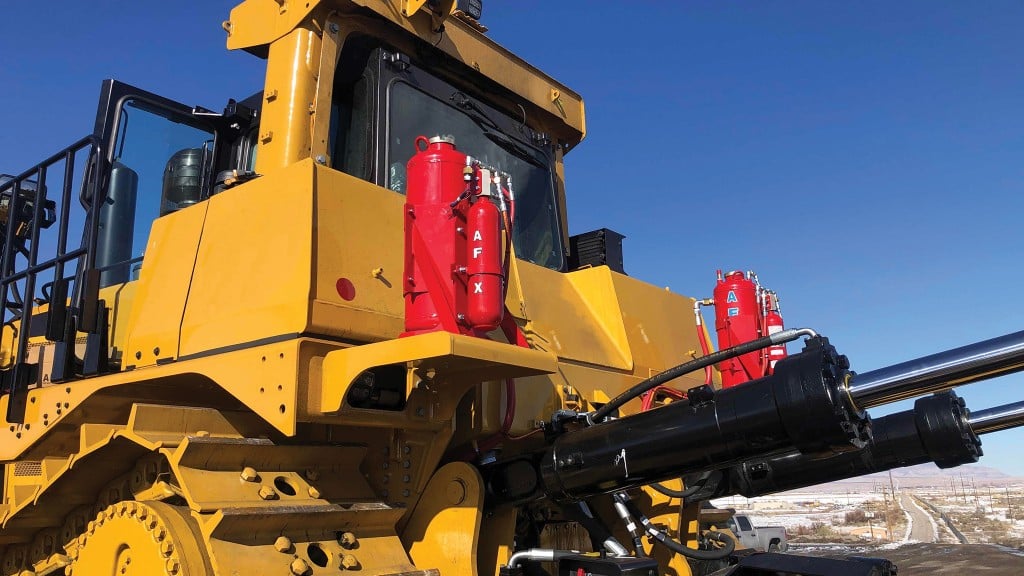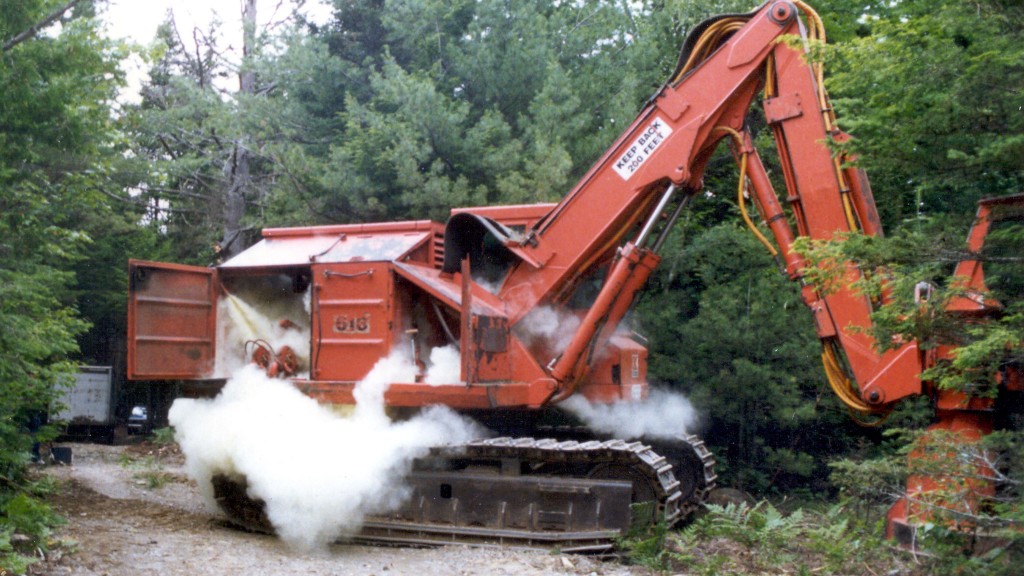Protect lives and property with automated fire suppression
On-board systems respond quickly to knock down fires on heavy equipment

It's nearing the end of a hot day at work on an industrial construction site. An excavator operator moves their machine across a dry, grassy field to park for the evening. Grass and debris that has collected unnoticed in the engine compartment heats up and catches fire.
This scenario might go a couple of different ways. One: The fire intensifies, starts burning more materials and, before the operator realizes it, there's a serious – and potentially life-threatening – problem right behind them. It's too big to use a hand extinguisher, if there's one available. The operator abandons the machine and calls for help while the excavator burns. The operator is safe, this time, but the excavator is badly damaged, and there's potential for a grass fire to start and cause even more harm to the surrounding area.
Or, two: The flame is detected by an automated system. The fire melts a detection wire or is picked up by a heat sensor, and tanks filled with fire suppressant spray into the affected area. The fire is knocked down, giving the operator more time to get clear. Damage to the machine and the job site is minimized.
On-board fire suppression systems are a regular sight on large mining equipment, popular on forestry machines, and becoming more commonly required in waste and recycling. Fire damage may not be the first problem that comes to mind for a construction fleet owner, but with equipment running at higher temperatures and working in hotter climates, automated fire suppression provides a level of insurance that protects against injury and damage.
AFEX Fire Suppression Systems has more than 50 years experience manufacturing automated fire suppression systems designed specifically for heavy equipment. It has partnered with FLO Components, a Canadian supplier of auto-lubrication systems for heavy equipment, to supply automated fire suppression systems in Ontario and Manitoba.
Fire suppression systems add insurance for fleet owners
For FLO Vice-President Mike Deckert, a veteran of four decades of dealing with heavy equipment, automated fire suppression is a lot like buying insurance – it protects lives and property if the need arises.
"They want to protect their employees and the surrounding area – a mine, a forest, a garbage dump, a recycling centre," Deckert says. "For customers in construction and recycling, automated fire suppression is increasing."
Deckert says machines parked in a maintenance shop overnight have experienced an electrical short, caught fire, and destroyed the shop. News reports talk about equipment catching fire in log yards, on construction sites, inside buildings – it may not be an everyday occurrence, but the possibility is always there.
Equipment fires tend to be caused by several factors. Tier 4 diesel engines feature turbochargers that run hotter than previous engine types, and the associated aftertreatment systems emit more heat than before, Deckert explains. Machines working in sectors with a lot of debris collecting in body panels and engine compartments – woody debris in forestry, for example, and general waste in recycling uses – are at higher risk of fires. Demolition work takes place in and around a lot of potentially flammable debris, as well as materials that can easily throw sparks. Even something as small as a frayed wire in the engine compartment can, in the right conditions, start a blaze.
Those factors become part of a fire risk assessment for fleet owners who are considering automated fire suppression. The assessment ensures that any unique challenges an operation might face – ignition sources, types of fuel, and insurance or regulation requirements – are addressed and the correct fire protection system is designed. From there, it is very similar to the process for installing the auto-lubrication systems FLO provides, Deckert notes.
"We look at the specific machine so that we obtain information about the proper size of tanks, the number of nozzles, and installation routing," he adds.
FLO Components teams handle individual design of the system, which includes a controller in the cab, tanks for the required fire suppression agent, piping, wires or sensors for detecting a fire, and the nozzles covering areas where potential fires may occur – turbochargers, transmissions, and batteries being the most common sites.
Automatic or manual triggers knock fires down quickly
When a fire breaks out, an auto-detection wire in the area melts, or a temperature sensor activates, triggering the system. Nitrogen bottles release into the tank and shoot dry or liquid chemical through a distribution network for quick knock-down of the fire.
There are also manual releases for when the operator or another worker spots a fire before the automated system is triggered. Up to three manual buttons are installed on machines, with one in the cab and others at ground level along the path of egress.
"The detection wire melts at 356 degrees F, and once that melts the controller alerts the operator that the system has activated," Deckert says. "If the operator sees flames before that, they can hit the manual button, or if a machine is parked and someone sees a fire, they can trigger the system from outside."
Most fires on heavy equipment can't be handled by handheld fire extinguishers and need a bigger response, Deckert adds. AFEX systems installed by FLO Components technicians offer three different types of chemical response to suppress the fire and give time for operators to get clear and emergency crews to react if needed.
"Dry chemical is like a fog, for fast knock-down of flames and suppressing the fire. It covers Class A [ordinary combustibles], B [burning liquids], and C [electrical] type fires. The liquid type removes the heat so it eliminates the chance of flare-ups afterward – it cools the hot surfaces. It handles A and B class fires, but not C," Deckert says. "The dual agent provides a dry and liquid system together."
Fire safety can't be trivialized, even if equipment fires aren't an everyday occurrence. When a fire does happen, it threatens lives, equipment, surrounding natural resources, and the greater environment. Automated fire suppression systems provide fleet owners with added peace of mind knowing that their equipment and people have an extra level of protection if the unexpected occurs.
Company info
6031 Oak Forest Drive
Raleigh, NC
US, 27616
Website:
afexsystems.com
Phone number:
800-231-3436




